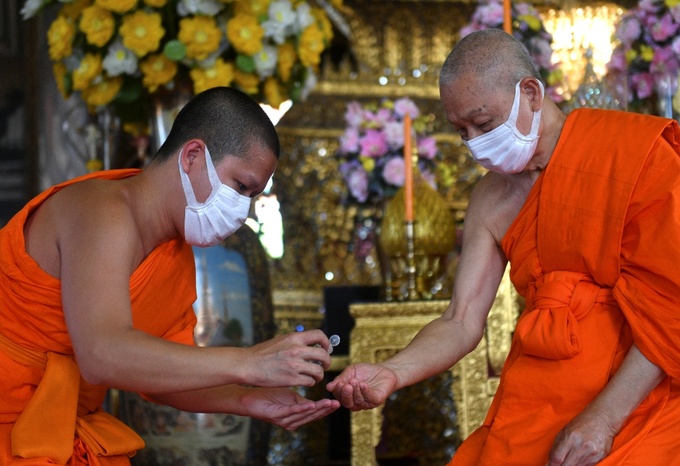
as they take part in a ceremony at Wat Suthat Thepwararam in Bangkok, Thailand.
The religious practices of hundreds of millions of people are undergoing profound changes in response to the COVID-19 pandemic caused by a new coronavirus. The crisis has prompted many religious leaders to appeal to their followers to not only take safety precautions but also to embrace their spirituality to help confront the health, social, and economic challenges ahead.
How has the pandemic disrupted religious observances?
In some cases, religious gatherings have proven to be hotbeds for outbreaks. Half of South Korea’s cases can be traced back to a meeting of the Shincheonji Church of Jesus, a Christian denomination. In Malaysia’s capital, Kuala Lumpur, several hundred Muslims who attended a mosque service contracted the virus, and in Washington, DC, a rector tested positive for the virus after performing communion at an Episcopalian church with more than five hundred congregants, all of whom were asked to self-quarantine for two weeks.
Many religious authorities are closing places of worship or limiting public gatherings. In an extraordinary gesture in February, Saudi Arabia banned foreign arrivals and halted visits to Mecca and Medina for umrah, a religious pilgrimage that Muslims can undertake at any time of year. Riyadh also briefly shuttered the Great Mosque in Mecca and the Prophet’s Mosque in Medina for disinfection. Many mosques have canceled Friday services, and calls to prayer in countries such as Kuwait and Malaysia have been altered to tell people to pray from home. Buddhist New Year celebrations, which often bring thousands of people together for public water fights and other events, have been canceled across South Asia.
during Holi celebrations in Ahmedabad, India.
The religious practices of hundreds of millions of people are undergoing profound changes in response to the COVID-19 pandemic caused by a new coronavirus. The crisis has prompted many religious leaders to appeal to their followers to not only take safety precautions but also to embrace their spirituality to help confront the health, social, and economic challenges ahead.
How has the pandemic disrupted religious observances?
In some cases, religious gatherings have proven to be hotbeds for outbreaks. Half of South Korea’s cases can be traced back to a meeting of the Shincheonji Church of Jesus, a Christian denomination. In Malaysia’s capital, Kuala Lumpur, several hundred Muslims who attended a mosque service contracted the virus, and in Washington, DC, a rector tested positive for the virus after performing communion at an Episcopalian church with more than five hundred congregants, all of whom were asked to self-quarantine for two weeks.
Many religious authorities are closing places of worship or limiting public gatherings. In an extraordinary gesture in February, Saudi Arabia banned foreign arrivals and halted visits to Mecca and Medina for umrah, a religious pilgrimage that Muslims can undertake at any time of year. Riyadh also briefly shuttered the Great Mosque in Mecca and the Prophet’s Mosque in Medina for disinfection. Many mosques have canceled Friday services, and calls to prayer in countries such as Kuwait and Malaysia have been altered to tell people to pray from home. Buddhist New Year celebrations, which often bring thousands of people together for public water fights and other events, have been canceled across South Asia.
of Santa Maria in Rome, Italy.
How might upcoming celebrations be affected?
It is possible that this year’s Hajj pilgrimage, scheduled for July 28–August 2, will be canceled. While such a decision would disappoint the roughly three million Muslims who planned to make the trip this year, it isn’t without precedent. The Hajj has been suspended about forty times since the first pilgrimage in 629 CE, including for cholera outbreaks and plagues. At the Holy See, Holy Week celebrations such as the Palm Sunday mass and Good Friday procession will be held without the public for what might be the first time in modern history, though they could be livestreamed as daily masses have been.
Easter, Passover, and Ramadan, which occur within weeks of each other in April, will face major disruptions due to social distancing policies. For example, pilgrims hoping to visit the Christian, Jewish, and Islamic holy sites in Jerusalem should be prepared to undergo the two weeks of quarantine Israel requires for anyone entering the country, as travel restrictions will likely still be in place. During Ramadan, a time when able-bodied Muslims fast, it is likely that communal iftar meals will be canceled.
